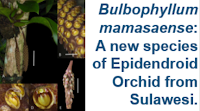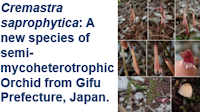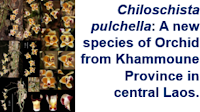Epidendroid Orchids, Epidendroideae, are the largest subfamily of Orchids, with over 15 000 described species, more than all other Orchid groups combined. The majority of these species are epiphytic (live on other plants, typically in the canopy of rainforest trees), though terrestrial forms are known. The group is found across the globe, with the exception of the polar regions, the deserts of Africa, Arabia and Australia, and the southern part of South America. The genus Bulbophyllum contains around 2200 described species from tropical regions around the world, making it one of the largest known genera of Flowering Plants, and is thought likely to contain many more undescribed species. Members of the genus can be very difficult to tell apart when they are not in flower, as their vegetative parts tend to be much reduced, often with only a single leaf emerging from a pseudobulb (a pseudobulb, like a bulb, is an enlarged stem base used as a food store by a plant during dormant periods, but unlike a bulb is not found in the soil).
In a paper published in the journal Taiwania on 1 July 2022, Sheng-kun Yu of Taipei, Chiu-Wei Wang of the Department of Biology at the National Museum of Natural Science, Kuo-Hsiung Wang of the College of Life Science at the National Taiwan University, and Tsan-Piao Lin of the Institute of Plant Biology at the National Taiwan University, describe a new species of Bulbophyllum from a coniferous forest growing at an altitude of 2200 m, in Chiayi County in western Taiwan.
The new species is named Bulbophyllum cryptomeriicola, where 'cryptomeriicola', in reference to the fact that it was discovered growing on Cypress trees of the genus Cryptomeria. This species is distinctive in that its rhizomes do not grow prostrate against the bark of a tree, but instead are suspended in the air by thick, erect roots.
Photos of Bulbophyllum cryptomeriicola. (A) Sheng-Kun Yu being lifted up a Cryptomeria japonica trunk. (B) Habitat of the patch of Bulbophyllum cryptomeriicola. (C) Inflorescence. (D) Lateral sepal, spread out. (E) Lip, view from above. (F) Column, side view. (G) Column with lifted anther-cap, with pollinia attached, view from below. Sheng-Kun Yu & Tsan-Piao Lin in Yu et al. (2022).
Bulbophyllum cryptomeriicola produces oblong leaves up to 3.5 cm in length and 1.5 cm in width, and paler on the underside. Flowers are produced in October on short peduncles arising from the pseudobulbs, each peduncle bearing 2-5 crimson red flowers.
See also...







